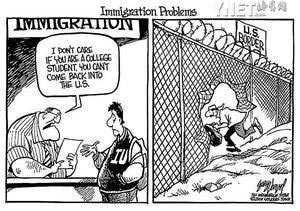| 栈道易堵陈仓难防(图) |
| http://www.sina.com.cn 2004/12/14 10:07 北京青年报 |
 栈道易堵 陈仓难防 Chinese students having trouble getting a US visa may wonder whether ordinary Americans care. Today's cartoon is a partial answer: most Americans do care provided they are truly aware of the difficulties foreign students face -- and if they distinguish between foreigners studying in America and the stream of immigrants entering the country. Those, however, are two pretty big ifs. Do American newspaper readers know that it has been harder for all foreign students to get permission to enter the US since 9/11? There are sporadic accounts in the press of such problems, but not enough to make much of an impression on the ordinary citizen without a personal reason to pay attention to such matters. The US response to 9/11 has been so large and on so many different levels that the problems of foreign students seem to most people of minor concern -- much less important than, for instance, all the problems associated with airport security. And some Americans feel that the visa authorities were much too lax before 9/11 -- after all, several of the Arab hijackers had been residing in the US on student visas -- so perhaps extra strictness, despite all the attendant inconveniences, is justified. Foreign students could get the story into the papers more if they knew how to work the system. In this regard East Asian students are among the most clueless: too often incurious and self-absorbed, they are notoriously out of touch with American society, and also slow to form advocacy groups. Thus most of the coverage in the US press comes not in response to effective student agitation, but to complaints by university presidents and business leaders to Congress or the State Department. And it has taken a long time for that irritation to build up among these prominent Americans: only in the past year have their anger and concern made it into the headlines, and even then usually not on the front page. Gary Varvel's cartoon is unusual in taking up an issue of such limited concern to most people. In contrast, illegal immigration, hundreds of thousands of people flooding in from Latin America every year, is very much on the mind of the American man in the street. But note that even this sympathetic cartoon is ill-informed: student visa applicants would be delighted if the arrangements in American consulates around the world were as friendly as in the cartoon. Why, you could actually insist on a civilized conversation over this sort of open counter! Just try insisting on anything through the heavy glass partitions in the usual US visa office these days!(听英文53598) |
| 双语漫画:栈道易堵 陈仓难防(图) |
申请美国留学签证遇到麻烦的中国学生也许会问,一般美国人对此是否关心呢?今天的漫画给出了部分答案:多数美国人会关心,但前提是他们真正了解外国学生所面临的困难,并且能把外国留学生与源源不断进入美国的移民区分开来。不过,这可是两个相当大的前提条件。 美国读报人士是否知道,9·11以后外国学生要想获准进入美国全都变得更难了?美国媒体对这些问题虽有零星报道,但并不足以给那些若无自身原因就不会关注此事的普通公民留下太多印象。美国对9·11的反应是如此之大,所涉及到的层面是如此之多,以致外国学生所面临的问题对多数人来说都成为次要的了,比如,与机场安全相关的种种问题相比,其重要性就小多了。还有一些美国人觉得,9·11前负责发放签证的机构过于松懈,要知道,几个阿拉伯劫机者此前一直持学生签证住在美国,所以,更加严格的签证政策以及由此带来的种种不便恐怕也是有道理的。 如果外国学生懂得美国社会的运作方式,就可以让有关他们的报道更多地见诸报端。但东亚的学生在这方面最没办法:他们往往缺少好奇心,一心只忙自己的事;他们与美国社会缺少接触则是众所周知的,同时也不善于组织团体来宣传。所以,美国新闻界的报道大多不是起因于有效的学生鼓动,而是缘于大学校长和工商业领袖对国会或国务院的诉求。这些美国知名人士对此积怨已久,只是在最近的一年中,他们的愤怒和忧虑才被写进新闻报道的标题,而即便有所报道,通常也不是在头版。 盖利·瓦尔维尔的这幅漫画不同寻常,因为它取材于这一多数人都不太关心的话题。相比之下,每年从拉丁美洲涌入美国的数十万非法移民才是当今美国百姓非常关注的问题。但是,就连这幅显示同情心的漫画也有不准确之处:如果全世界美国领事处的办事方式都像漫画中那样友好(如签证官也是站着,与申请者之间没有玻璃隔层),那么申请签证的学生会非常高兴。是啊,在这种开放式的对话平台上你的确可以要求彼此间文明对话!可是,透过美国使领馆签证处厚厚的玻璃隔层你提出一个要求试试,看看会有什么结果! |
|
|
|
|
|
| Annotation |
| 新闻查询帮助 | |
| 热 点 专 题 | ||||
| ||||
|
|
教育频道意见反馈留言板 电话:010-62630930-5178 欢迎批评指正
新浪简介 | About Sina | 广告服务 | 联系我们 | 招聘信息 | 网站律师 | SINA English | 会员注册 | 产品答疑
Copyright © 1996 - 2004 SINA Inc. All Rights Reserved
版权所有 新浪网![]() 北京市通信公司提供网络带宽
北京市通信公司提供网络带宽